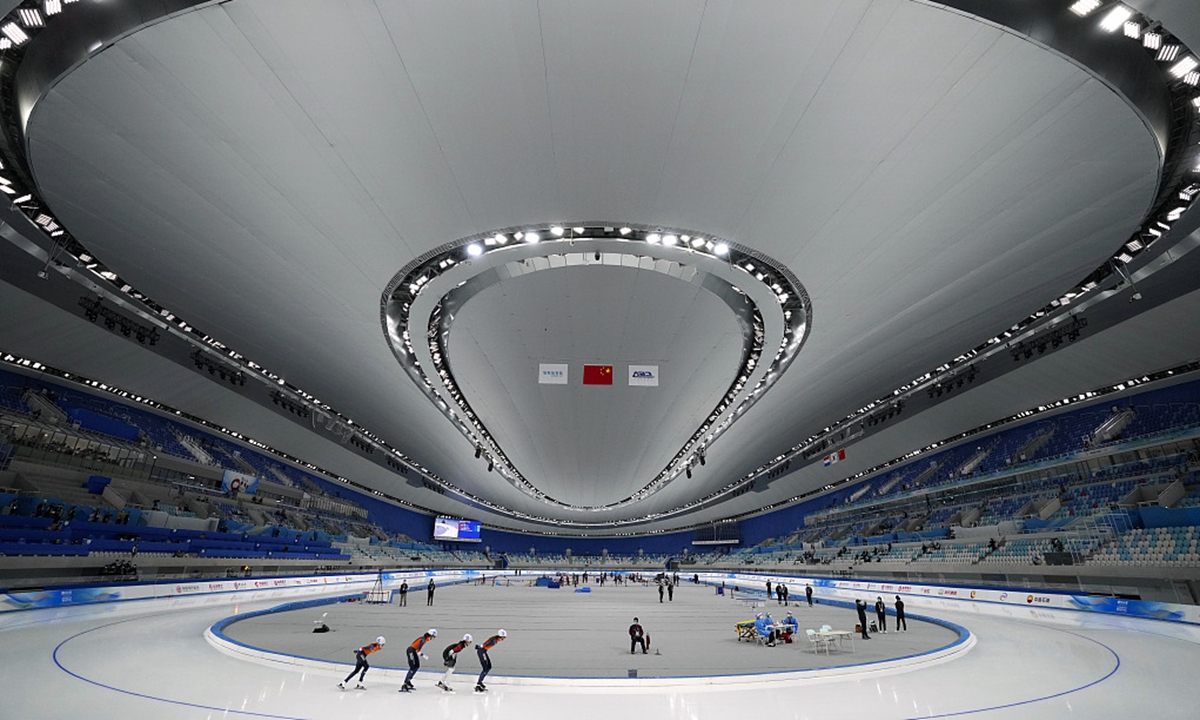
Members of the Chinese and Netherlands teams compete in the women's mass start during the Speed Skating China Open, a test event for the 2022 Winter Olympics, at the National Speed Skating Oval in Beijing, on Oct. 10. Photo: CFP
Athletes who don't comply with the Beijing Winter Olympics' epidemic prevention rules could face disqualification, expulsion from the competition or more severe penalties, the Beijing Winter Olympics Organizing Committee said on Wednesday.
At a news conference on Wednesday, officials of the Beijing Winter Olympics Organizing Committee introduced the details of the epidemic prevention and control measures for the event, including the punishment for those who will fail to comply with the committee's requirements.
Those who do not comply with the provisions of the epidemic prevention guidebook may face more serious consequences such as warnings, temporary or permanent revocation of registration, temporary or permanent disqualification, expulsion from the competition, and disqualification from relevant qualifications, said Zhang Jiandong, an executive vice chairman of Beijing Winter Olympic Organizing Committee and vice mayor of Beijing, at the news conference.
Zhang stressed that the measures described in the epidemic prevention guidebook are based on the latest scientific research, expert opinions, and also the experience of other international events.
"We believe that these countermeasures can mitigate the risk and impact of the epidemic, and we hope that all Olympic-related personnel will fully cooperate, comply and enforce these regulations," Zhang said.
He said more details of the penalties are being communicated with the International Olympic Committee (IOC).
On Monday, the Beijing Winter Olympics Organizing Committee released its first edition of the official guidebook concerning epidemic prevention as Beijing strives to control sporadic COVID-19 cases as winter approaches. The guidebook was jointly released by the IOC and the Beijing Organizing Committee.
According to the guidebook, all athletes and accompanying officials are encouraged to get vaccinated except for a small number of them with medical exemptions. All athletes will be managed in a closed-loop management system, like a "bubble" separated from the general public, directly after arrival and will have to stay in the bubble.
"The closed-loop management will not impose strict restrictions on the daily activities of athletes and other participants," Zhang explained. "Because inside the closed-loop area, they can move freely between the premises, the venues and the three competition areas by dedicated transportation."
At the same time, within the closed loop, the organizing committee will provide athletes, officials and media with a great experience, such as specialty dining, licensed merchandise retail, cafes and gyms, as well as recreational facilities, Zhang said.
Currently, the venues and infrastructure for the Beijing Winter Olympic Games have met the requirements for hosting the games. All 12 competition venues have been completed and certified by international winter sports organizations and are fully equipped to host the games. By the end of December, all supporting projects will also be completed, officials said at the news conference.
The Beijing Winter Olympic Athletes Village will officially open on January 27, 2022, the organizing committee said on Wednesday. Some athletes have already arrived in China and entered the closed-loop management, according to a previous report.
The 2022 Beijing Winter Olympic Games will be taking place from February 4 to February 20, 2022.
Global Times



